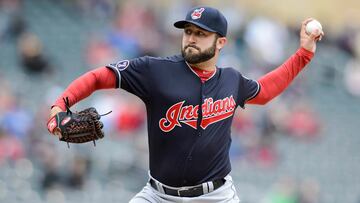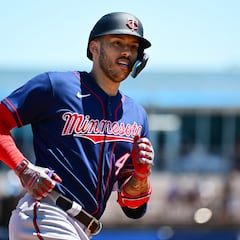Should gay baseball players fear coming out? Is MLB a hostile environment for gay players?
With the news that former MLB pitcher T.J. House has come out and felt “shame” for many years has left us wondering about how hostile baseball is


TJ House was living the American dream. The Picayune, Mississippi native was a relief pitcher for the Cleveland Guardians and the Toronto Blue Jays, living out his childhood dream in the Big Leagues. But something was lacking, a piece of his life that made him more miserable than most of us could ever imagine.
House was loved for what he did most of his life, but what he longed for was to be loved for who he was. TJ House announced his engagement to be married to his partner, Ryan Neitzel, on Facebook last Thursday and started the process to “rip off” the “bandage that covers a wound that needs fresh air to heal.”
Love. It’s a simple word, one that carries much weight and meaning. Each of us defines love in a different way, but at...
Posted by Tj House on Thursday, December 8, 2022
With his public coming out, TJ House becomes only the third MLB player ever to be openly gay. Following in the footsteps of Glenn Burke and Billy Bean, House has decided that he will no longer hide who he is just so that he can play the sport he loves.
“Shame has kept me quiet all these years, but Love has finally set me free,” said House in the post.
Is baseball a hostile environment?
This is a tricky subject to tackle, because while it can be argued that baseball is not a particularly hostile environment, it is like any sport, an element of the society that surrounds it. The USA is a dichotomy, like the famous Winston Churchill quote, it is “a riddle, wrapped in a mystery, inside an enigma.”
Fundamentally we are a liberal society. Always have been. Equality, democracy, freedom. Those were revolutionary ideas at the time. Forward-thinking, liberal-minded founding fathers set our nation in motion under lofty ideals rooted in enlightenment.
Former professional baseball player TJ House announced his engagement, and reflected on coming out, in an emotional Facebook post.
— TODAY (@TODAYshow) December 13, 2022
“Love. It’s a simple word, one that carries much weight and meaning,” House, 33, wrote in the lengthy post. https://t.co/8JfCzJWe7j
But that liberalism was, and remains, tempered by a deep-seated conservatism. Even today, and despite what news outlets who are more interested in warring for ratings and “likes” would have you believe, the vast bulk of Americans fall along the middle of the spectrum. The liberals are incredibly conservative, and the conservatives are amazingly liberal.
Baseball falls smack into the center of this golden triangle, as American as mom and apple pie. Resistant to change and fundamentally conservative, but with doors thrown open wide. A contradiction at every turn, just like America itself.
It is always problematic to have a non-LGBTQ+ player remark on the hostility of a particular environment. As a former player and now baseball correspondent, I would argue that baseball is a fairly welcoming place, the least likely of the top-five American sports to make being gay a barrier. But that is easy for me to say. I have, quite literally, no skin in the game.
Glenn Burke, the only one of the three MLB players to come out while he was playing, had a different view of the national game. Never willing to hide his homosexuality, he told the New York Times that “prejudice drove me out of baseball sooner than I should have.”
With gender politics so dear to Burke’s heart, it is perhaps fitting that his lasting legacy, not only to the game but to the world, was his invention together with Dodgers team mate Dusty Baker of the high-five. Now one of the most utilized and ubiquitous gestures in the world, Burke originally intended it to be a symbol of gay pride.
In the case of Bean and now House, the players felt that coming out was an act best reserved for their retirement from the game.
When heterosexual players and fans consider how welcoming a sport is to the gay community, we all think alike. Football is testosterone driven, with a kind of über-masculine makeup that would give anyone pause. Basketball prides itself on being a game that is as comfortable on the street as in the arena and gives ground to tons of swagger. But baseball is staid, calculated, perhaps more calm, played not with emotion but with an almost Zen-like clearing of the mind.
Which makes it all the more uncomfortable to find out that our gay compatriots fear our reaction when they reveal to us their true selves. And make no mistake, there are gay players in the Major Leagues today.
With somewhere between 2% and 10% of any population being homosexual, depending on whether you believe the more liberal or conservative studies, then there are between 22 and 109 players around the league who are gay or bisexual. It is simply a mathematical certainty.
Former MLB pitcher TJ House has come out as gay and announced his engagement to partner Ryan Neitzel
— NowThis (@nowthisnews) December 13, 2022
Read more: https://t.co/n27EdFNLpi pic.twitter.com/3F0SEbGJUk
Related stories
None of this knowledge makes it any easier for a young player to take off the mask that he has learned to wear all of his adult life. But perhaps we can take TJ House’s announcement as a clarion call to try and make it plain that it doesn’t matter to the vast majority of us who truly love baseball.
House put it plainly. “Love you see, it’s for everyone.” Wise words, indeed, and ones to contemplate. So think about that when you give someone a high-five.

